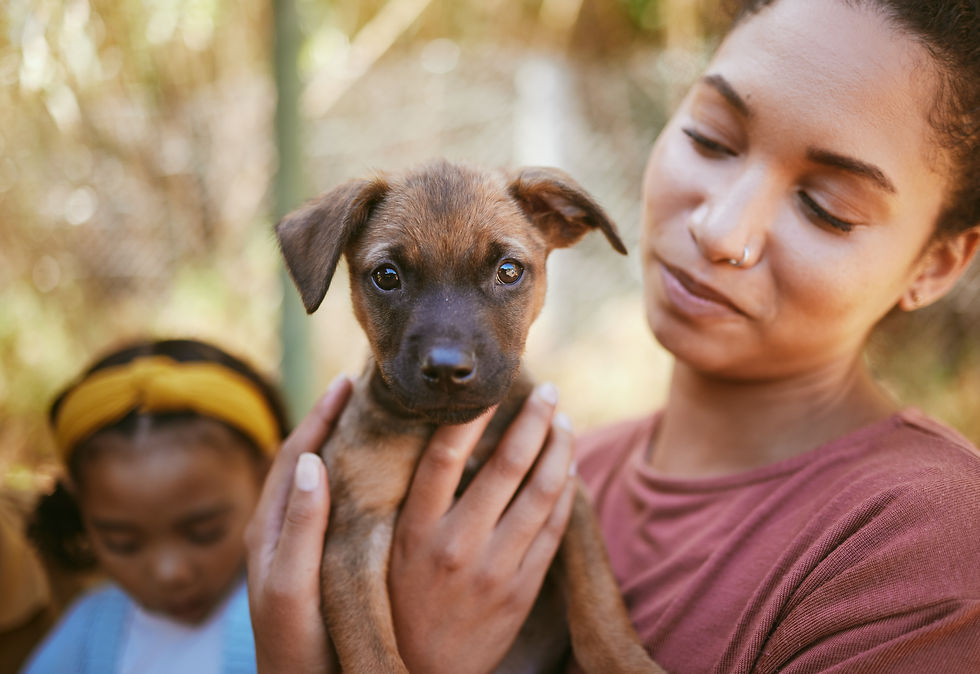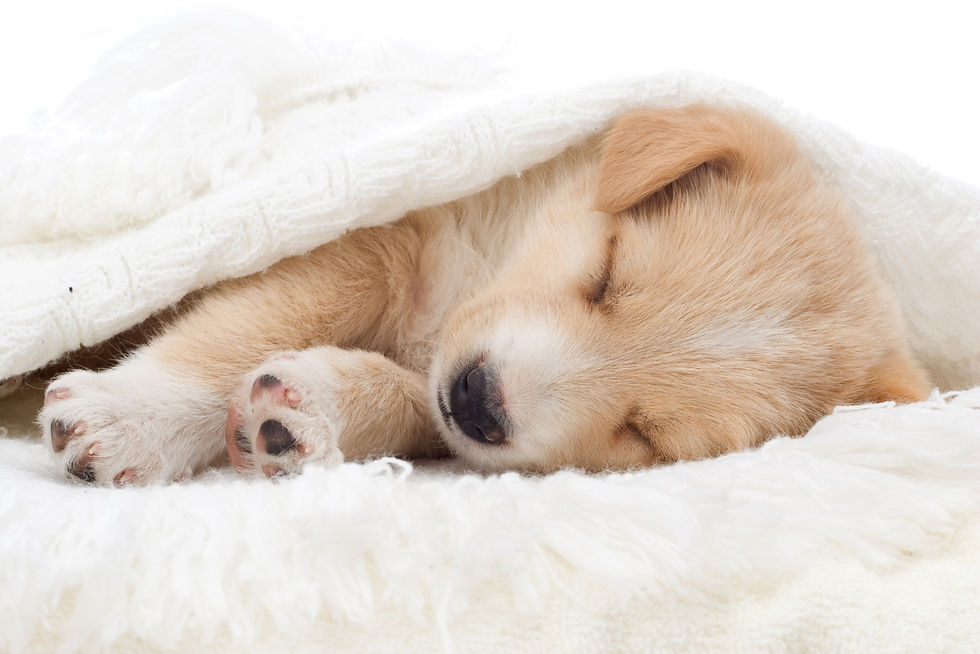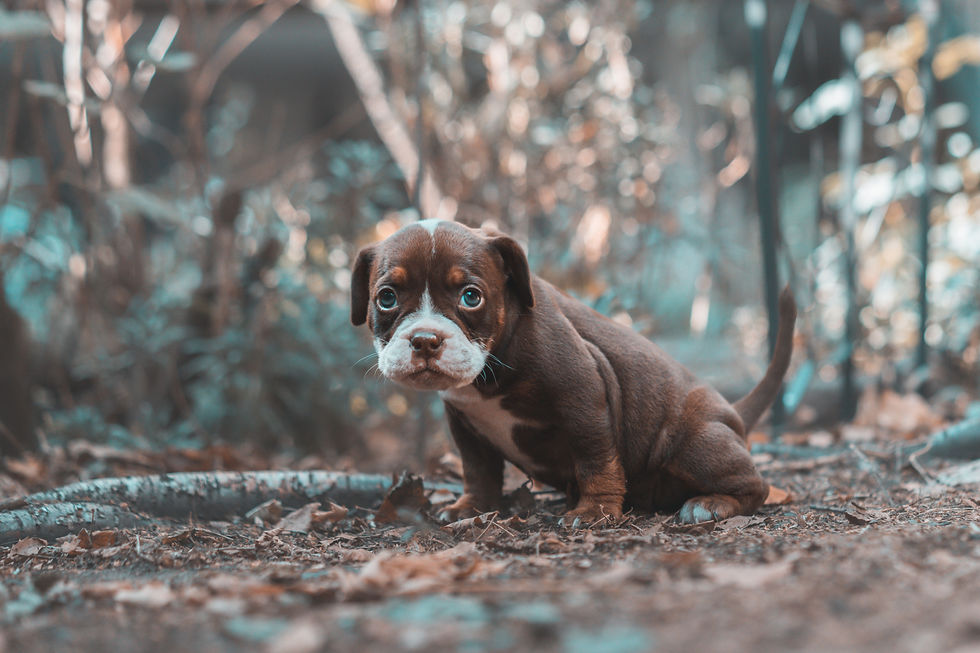Dos and Don'ts for Puppy Biting
- Lauren Kidd

- Nov 11, 2025
- 6 min read

Anyone that’s been bitten by an overly enthusiastic puppy can attest to how quickly cute becomes cringe. Puppies have sharp, needle-like teeth that can cause great discomfort to fragile human skin.
However, biting and nipping are normal forms of canine play and communication.
In fact, puppies biting each other helps them learn how to control their mouth and use their teeth with precision.
Play biting and correction biting are essential communication tools for canines and prevent further conflict and violence.
At a young age, puppies quickly learn how hard is too hard based on the squealing feedback from litter mates and mom.
While biting and nipping other dogs is healthy, normal, behavior, puppies must learn at a very early age that human skin is completely off limits.
Here are 4 Do’s and Don’ts to help teach your puppy this essential life skill to survive in the human world.

Do consistently redirect your puppy with a toy or chew.
While puppy biting is 100% normal behavior, it is not in alignment with how we want our puppies to behave in the future. Puppy biting isn’t so cute or harmless when that puppy grows into an 60 lb. adolescent.
Create good habits for you and your puppy by always having a toy handy when it’s time to play. Some pups are picky, so be sure to try a variety of different toys and materials.
For rowdy puppies, try purchasing an oversized dog shaped stuffy to simulate a litter mate. Puppies who like to tackle and play rough seem to enjoy the life -sized bite target- try to find a stuffy that is the same size or bigger than the puppy.
This is my personal favorite toy recommendation for puppies- puppies seem to LOVE tackling and rough housing with this fluffy guy.
If your puppy chooses to chomp up your arm and ignore the toy or chew, stop the game and step out of the room for a few minutes. The shock of this super fun game ending abruptly will help teach your puppy that biting humans = game stops.
By consistently holding your pup to this very specific play standard will cement polite play habits for your pup.
In addition to stuffies and tug toys, be sure to have puppy safe chews for when your puppy needs a little extra release, particularly when they are teething.
Avoid chews that are too hard, like antlers, horns, or hooves, as these can break or chip puppy teeth.
Be sure to only provide natural, whole food chew options and avoid highly processed items with harmful dyes and chemicals.
Other countries have different standards for dog chews, so I recommend only purchasing dog chews made in the USA.
Each puppy is an individual and different breeds of puppies may have different chewing needs, so be sure to consult your personal vet with any questions.
Some examples of puppy safe chews include: Cow ears, pig ears, rabbit ears, fish skins, No Hide chews, frozen carrots, or frozen wash cloths soaked in dog safe bone broth.
Larger or older puppies with some of their adult teeth may be able to enjoy bully sticks and slices, but always check with your vet first!
Always supervise your puppy with chews and be sure to take away small pieces, as these can become choking hazards.

Don’t change the rules and play with your hands
Life happens and it can be tempting to throw caution to the wind and occasionally use your hands to rough play with your puppy.
Resist this urge and stop right there. Don’t let other people do it either (children, boyfriends and husbands- I’m looking at you)
On and off playing with your hands sets your puppy up to fail. This inconsistency will create confusion and is not fair to your pup.
How are they to magically infer that today is a safe hand biting day and tomorrow is a toy only day?
Be fair to your pup and stick to the rules. No hands, no excuses.

Do model calm behavior.
Most puppies do not need to be any more amped than they already are. Intentionally riling up your puppy can result in an increase of biting, jumping and out of control behavior.
Do your best to counter your puppy’s wild energy with your calm energy. Move in slow, deliberate movements, speak in soft tones, and take deep breaths to calm your own nervous system.
Redirect your puppy to an appropriate toy or chew and create clear boundaries between playtime and not play time.
If you are working from home on your laptop, don’t get caught up in the occasional toy toss or attention barking. Biting can also happen as a means to get attention and is often, very effective. Yelling and scolding your puppy still counts as giving them attention, so instead, simply remove them from the action.
When you can’t/ don’t want to play with your puppy, put them in their own area (baby gates, play pen) or crate. They will either nap or self soothe- both are a win for puppy’s overall development.
By placing your puppy in a separate area, you create clear boundaries between “play time” and “quiet time”.

Don’t escalate the situation
Misinformed dog enthusiasts may recommend getting physical with a biting puppy to show them who’s in charge. While it is important to uphold consistent rules and boundaries for your puppy, a 100 + lb mammal needing to show a 15-20 lb puppy who is stronger, is as silly as it is counterproductive.
Puppies are babies and instinctively know they are weaker and smaller- a puppy that plays happily with the owner, even if they are occasionally rebuffed for over exuberance, is a confident, happy puppy.
Making your puppy fear you is counterproductive and sets you and your puppy up for a relationship based on fear and mistrust. Later in life, this mistrust will turn around and bite you in the a**.
In tense, real-life situations where you NEED your training to actually count, this fear and distrust will manifest and your training will fall apart.
Smacking, slapping, pinching, biting ( I can’t believe I have to say that one), scruffing or “alpha rolling” your puppy is un- productive and unethical.

Do make sure your puppy is getting enough sleep
If you are giving your puppy regular exercise and attention, offering them appropriate toys and chews, and they are STILL biting like crazy, chances are they are over tired.
A huge percentage of the puppies I see in my practice are chronically exhausted and overstimulated. Puppies who are exhausted tend to become little biting machines, causing tension and frustration for owners.
The owners constantly try to redirect the puppy or tire them out with more exercise. This results in an even more exhausted and badly behaved puppy.
Puppies under 6 months old require at least 20 hours of sleep per day to develop properly.
Very few puppies are actually getting that amount of sleep, resulting in grumpy puppies and even grumpier people.
This is where crate training and crated naps become essential. If you were on the fence about crate training your puppy, I hope this knowledge tips the scales and you take the leap.
When your puppy starts getting a little too bitey, put them in their crate for a nap.
Put the crate in a quiet area of the house and use a noise maker or box fan to block sounds. Cover the crate with a light blocking fabric to create a dark, calm environment.
A good rule of thumb for puppy naps is 1 hour of play, followed by 2 hours of sleep. Getting enough sleep will help improve your puppy’s health and overall behavior.

Don’t set your puppy up to fail.
Typically, when owners first bring a puppy home, they are absolutely smitten by the big baby eyes and velvet soft fur. The oxytocin hits our system and clouds our judgement.
Those big ole puppy eyes highjack our reasoning skills and cause many people to forsake all rules and boundaries for the new fur baby.
However, rules, routines, and boundaries are essential for healthy puppy development.
People often mistake rules and boundaries as punitive or cruel behavior. This is simply false.
Little puppies with tiny brains are incapable of making good and safe decisions.
They depend on us, the humans, to guide them and keep them safe. When we don’t set rules and boundaries for our puppies, we are unintentionally setting them up for failure later in life.
Allowing crazy rough play, biting, and other obnoxious behavior while a puppy is young and cute, but then abruptly punishing them for that exact same behavior later in life, is cruel and unfair.
Set your puppy up for success by implementing a predictable daily routine with lots of scheduled rest time for your puppy.
Stay consistent with rules and boundaries, so your puppy understands what is expected of them.
Without consistent sleep, rules, and boundaries, we are accidentally setting our puppies up for failure instead of success.
By providing our puppies with consistent redirection to appropriate toys, modeling calm behavior, and providing a steady routine with proper sleep, we can successfully persevere through the trying stage of puppy biting.




Comments